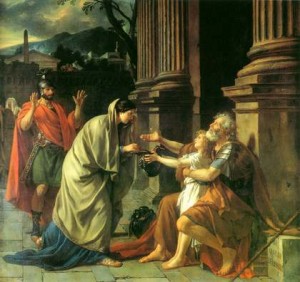Did Justinian have Belisarius blinded?
Reader Bryan asked what I thought of the legend that Belisarius was blinded by Justinian. According to the story, a jealous and fearful Justinian arrested Belisarius after his final victory and had him tried for treason. The loyal general’s eyes were put out, his estates confiscated, and he was forced to wander the streets of Constantinople begging for bread while contemplating the vicissitudes of fortune.
Belisarius did briefly fall out of favor late in Justinian’s reign, but was publicly rehabilitated. The story of his blinding originated in the 12th century with the monk John Tzetzes who was trying to criticize the political figures of his own day. It made for a good morality tale, and was pressed into service in the 18th century by Europeans (mostly French) who saw a parallel between the tyranny of Justinian and their own autocratic societies. (see the spectacular painting by Jacques-Louis David and the play ‘Bélisaire’ by Jean-François Marmontel)
Some scholars still argue that the legend does have some basis in fact (Justinian was certainly capable of it), but there are several reasons not to accept it. The Crusaders who sacked Constantinople in 1204 mentioned several large statues of Belisarius still standing. Had he been blinded and disgraced these surely would have been torn down. Along the same lines there was also a great cycle of mosaics detailing the victories of Justinian and Belisarius above the gate to the imperial palace. These were made during Justinian’s lifetime and were still in place a thousand years later. Finally, there are the writings of the contemporary historian Procopius. In his ‘Secret History’ he makes no mention of the emperor humiliating his general, despite the fact that he clearly hated Justinian and was trying to blacken his name. He accuses Justinian of being a devil in the shape of a man, of being responsible for the deaths of a trillion people, and of having a head that would routinely disappear- but not of harming Belisarius.
Nevertheless the legend persists- perhaps because its lesson still resonates. As Henry Wadsworth Longfellow summed it up neatly in his poem about the great general:
“Ah! Vainest of all things
Is the gratitude of kings.”
